Australia announces $30 bln broadband plan

Australia announced plans to build a 30 billion US dollar broadband network, its biggest infrastructure project ever, opting to retain government control rather than contract out the deal.
In a surprise move, Prime Minister Kevin Rudd said he was abandoning a tender process that failed to offer value for money, and that a new government company would instead build the network with private sector support.
Calling Australia a "broadband backwater," Rudd said the current network was hampering the economy and compared the importance of the project to the appearance of electricity in the 20th century.
Providing a fast, affordable broadband network was a major campaign promise when Rudd's centre-left government was elected in November 2007, with the existing copper wire network slower than that in most developed countries.
"Just as railway tracks laid out the future of the 19th century and electricity grids the future of the 20th century, so broadband represents the core infrastructure of the 21st century," the prime minister said.
"Slow broadband is holding our national economy back."
The government had been considering tenders from private companies including Singapore-owned Optus and Canada's Axia NetMedia for a so-called fibre-to-the-node network offering speeds of up to 12 megabits per second.
But Rudd said the government would instead form a company, in partnership with the private sector, that would build a more advanced fibre-to-the-home network offering speeds of up to 100 megabits per second.
He said 90 percent of Australian homes and businesses would be able to receive the new faster connection, with the rest of the country receiving a connection at 12 megabits per second.
He said a government-commissioned panel of experts had recommended scrapping the tender process.
"None of the national proposals offered value for money to the Australian taxpayer," Rudd said.
The overall investment from government and the private sector will reach 43 billion Australian dollars (30 billion US) over the eight year construction phase.
Rudd described the project as "the single largest nation-building infrastructure project in Australia's history."
He said construction would begin early next year, with the government retaining a majority stake in the project and then selling it to the private sector five years after the network is up and running.
Australia's largest telecoms firm Telstra was excluded from the initial tender after failing to meet government criteria for the project but will be invited to take part in the new plan.
Telstra shares, which have dipped as the telecoms giant engaged in a series of regulatory spats with Canberra, rose 4.4 percent to 3.35 Australian dollars on news it would no longer be frozen out of plans for the broadband network.
"We look forward to having constructive discussions with the government at the earliest opportunity," chairman Don McGauchie said.
Rival telecom Optus also welcomed the plan, saying it had always viewed the scrapped fibre-to-the-node proposal as a stop-gap measure.
"It's been a visionary and big step forward that will lift Australia from the broadband laggards where we are today into what we see as being a world-leading broadband future for Australia," an Optus spokesman said.
(c) 2009 AFP















